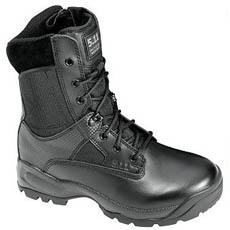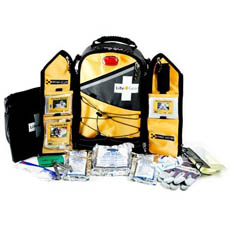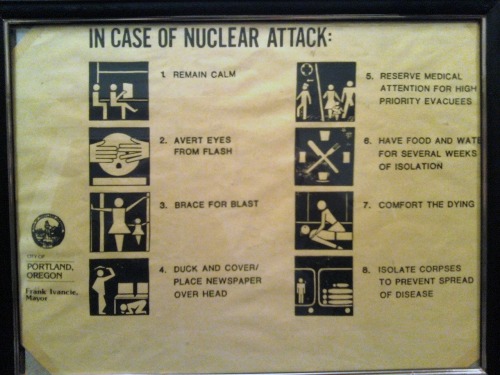This is cool. I’m not sure if it’s really one of the world’s 100 best pranks – but it’s very clever…

Tag: How To
How to slice a banana without removing the skin
Preparing your zombie apocalypse kit
When I was living in North Queensland people used to madly rush to the shops whenever there was a cyclone warning. This caused untold stress on cashiers and often meant rudimentary items were suddenly highly prized – bringing the laws of supply and demand into play and causing price hikes on staple items. So when it comes to getting ready for the no doubt imminent zombie apocalypse it pays to be prepared. Here’s a handy list of items you should put together and keep somewhere safe – and accessible – you don’t want this in the garden shed when there are zombies banging on your door.
How to write well
Amy linked to this list of tips for writers the other day. It applies to any application of the written word. A bunch of authors supplied tips to the Guardian on how to be a writer – this has got to be one of the most comprehensive collections of these types I’ve ever seen assembled. It’s so big it has been split over two entries.
- If you use a computer, constantly refine and expand your autocorrect settings. The only reason I stay loyal to my computer is that I have invested so much ingenuity into building one of the great autocorrect files in literary history. Perfectly formed and spelt words emerge from a few brief keystrokes: “Niet” becomes “Nietzsche”, “phoy” becomes ”photography” and so on. Genius!
- A story needs rhythm. Read it aloud to yourself. If it doesn’t spin a bit of magic, it’s missing something.
- Editing is everything. Cut until you can cut no more. What is left often springs into life.
Mad Skillz: Mad on mad skillz
My little sister obviously didn’t get the memo. You know. The one I addressed to the whole world inviting contributions for the increasingly inappropriately named “Mad Skillz Week”… you can decide the basis that I think the name is inappropriate for yourself. Anyway, Maddie, aka little sister number 2, had this to contribute.
I was annoyed that Nathan didn’t ask me to give input during mad skillz week. I thought perhaps he didn’t believe I had any mad skillz, and he may have been right.
I’m Mad, but the skill part still eluded me. I considered giving 5 tips on how to be me. But then if all the readers took my advice there could be maybe 3 or 4 of me running around and so I thought the better of it.
I considered writing 5 tips on how to be a cat lady.
- Buy two cats of the opposite sex.
- Never shower.
- Walk hunched.
- Wear scarves and cardigans.
- …
Well now you see the problem. Plus since I’m not actually a cat lady it seemed like a fallacy.
Still I was convinced I could give 5 tips on something. Then it hit me…
Mad on How to share mad skillz:
(in no particular order of importance, except point 4)
- Be humble. Suggest you’re not that skilled, that there are a million people better than you and that you only have the skills because they were bestowed upon you by a mentor/teacher/father figure.Including other people’s names makes it clear you’re not a self centred blogger and that you’re part of a real world community without suffering some superiority disorder. I’m not really sure I’m qualified to advise you on how to write about your real skills, but growing up with Nath has taught me a little about writing stuff.
- Never say your skills all come naturally. If people are reading about your skills part of them wants to be like you. Fill them with a little false hope – tell them if they work hard they’ll be able to do your skill too. Anyone could write 5 tips to others, all you need is a skill and a communication medium – chisel/stone tablet, pen/paper, fingers/iPhone.
- “Although seemingly contradictory to rule number 1” – this phrase should always be included in your 5 key points. why? Because it shows there are shades of grey, there’s no best way, and it makes it look like your skill is a fine balancing act – so is actually a real skill.And although seemingly contradictory to point 1, it’s important your 5 points show that you are skilled, don’t shy away too much from your abilities because if people think you don’t know what you’re talking about why should they listen??? I know this because I won a public speaking award in grade 10.
- Always have something funny in point 4.
- Don’t put too much technical jargon in your points, but do include examples, photos, diagrams, flow charts – things that can be grasped fast. People outside your world aren’t familiar with the culture and stuff. And to be honest they probably don’t care about technicalities because how many people are going to become substitute roller-skating photography teachers? Not many.

They are interested in the general gist of your skillz. So stick with simple words, concepts and grammar. Keep it short. <- see?
So there you have it – if you’re inspired feel free to keep sending mad skillz my way – nm
How to write a post that links to other posts
Sometimes I read links to awesome posts about cool stuff where the person does such a good job of describing the content at the other end that I don’t feel the need to click through. This is probably a bad thing. A few weeks back Kottke linked to a post about how to write an incendiary blog post. His post was good. I shared it via google reader, and thought nothing further of it.
Then Amy linked to the same post and I read the original. It’s funny. You should read it – and make sure you check out the comments too…
This sentence claims that there are many people who do not agree with the thesis of the blog post as expressed in the previous sentence. This sentence speculates as to the mental and ethical character of the people mentioned in the previous sentence. This sentence contains a link to the most egregiously ill-argued, intemperate, hateful and ridiculous example of such people the author could find. This sentence is a three-word refutation of the post linked in the previous sentence, the first of which three words is “Um.” This sentence implies that the linked post is in fact typical of those who disagree with the thesis of the blog post. This sentence contains expressions of outrage and disbelief largely expressed in Internet acronyms. This sentence contains a link to an Internet video featuring a cat playing a piano.
Here’s my favourite comment…
“This comment is by a trolling Jehova’s Witness who is filled with brotherly love for all the other commenters, but knows without meeting any of them that they all deserve to burn in hell forever. Fortunately, anyone willing to read this far is already jaded from way too much time spent reading comments.”
The moral to this story (other than that you should read both Amy’s blog and Kottke.org) is that you should always click through to interesting links.
How not to cut yourself with sharp knives
I love reading professionals giving tips for everyday living. This interview with a butcher is fascinating. He gives five tips (in detail) that I’ll summarise here on how not to cut yourself.
- Keep the knife in your hand
“You should hold your knife like the butt of a pistol, fingers wrapped tightly around the grip “like someone was trying to take it away from you.” Some people hold a boning knife like a conductor’s baton during a particularly slow part of Pachelbel’s Canon. This is wrong. You will either drop your knife through your fingers, causing you to cut your knife hand with your knife, or, more likely, lose track of it in your brain’s motor control center and cut the hand holding the meat.”
- Don’t cut towards yourself
Putting all your strength into a brazen “take it to the board” type of cut is a sure way to bury a knife in your chest, belly, femoral artery or … genitals. We’re not talking stitches here, we’re talking surgery at best and coffin at worst.
- Keep everything clean.
We take care to avoid fat buildup on our knife handles to prevent what I like to call “the knife handshake,” which consists of having your lubricated fist slip over the grip and onto the length of the blade. Wash your hands. Wash your knives. Thoroughly. Often.
- Do not leave knives on the table, ever.
This applies mainly in a butcher shop. The reason we wear somewhat garish knife scabbards on our hips is to avoid ever setting a knife on the table. Why? Our pieces of meat are large and heavy, and knives can be well hidden. Add force and weight, and you can imagine what might happen to your hand or forearm. Gross.
- Bones can be really sharp.
Bones, particularly the chine and feather bones along the spinal column, become extremely sharp and dangerous when cut by a carcass splitter.
Speaking of knives – I’ve been looking for an opportunity to plug a bunch of knives I bought online recently that have turned out to be incredibly awesome and very sharp. They’re also cheap. They are Thai restaurant style chef’s knives and cleavers and they’re the sharpest knives I’ve ever played with (not that playing with knives is a good idea).
Mad Skillz: Ali on being poetic
Ali writes a poetic blog. Which by default means it’s deep. It’s not necessarily all about poetry but it’s the type of blog where just reading makes you feel more artistic and creative. That’s her milieu (to steal an artistic French word). To my knowledge we’ve never met – but we’ve both lived in Townsville. Ali is a former “Steve Irwin” style animal wrangler (as indicated by her link). This gives her some sort of credibility with those who don’t like poetry…
Here are Ali’s tips on how to be, or appear, poetic.
Let me first just say, I don’t get around calling myself a ‘poet’ so I feel like this is something of a joke, and there are those out there who with more credibility than me, so feel most free to comment/differ/add stuff. (My other option was editing, which might have been more use to some but would have been just as farcical. However, if you would like to know how to catch a koala, read here.
I supplemented this with some material from a course I did with Judith Beveridge, so you get something from a real expert.
- Read poetry. Read lots of it, and read the great poetry so your bar is high, but also read contemporary poetry (they are not necessarily mutually exclusive, but a lot of the known greats are actually dead). Having said that, the thing that actually started me writing poetry – even though I’d read it since school – was a friend giving me a poem they wrote for me, and it suddenly came within the realm of possibility, when I had never really thought about it before.
- Find out what sort of poet you are, your sympathies and approach. Then learn by imitation. It is actually the way to learn all art forms.
- Know the elements and rules of poetry. Read a book like “Rules for the Dance” by Mary Oliver (otherwise this post will never end). Only when you know the rules (rhythm, metre, line, form, sound, image, metaphor etc) can you break them effectively and do the “freefall” (as Mark Tredinnick called it) nicely (same goes for grammar might I add – that’s what MT was actually talking about). As with all creative writing, show and don’t tell. (So mostly don’t use abstractions – eg a word like “beautiful” is an abstraction so describe the elements of the beauty instead – or else interpret the concept/abstraction with an object eg “quiet as a house in which the witch has just stopped dancing” – “quiet” is the concept, the rest is the object (and obviously the whole thing is a metaphor) – I snitched this example from Judith Beveridge.)
- Work hard on language and find the language appropriate to the experience, and the appropriate form. The style and the content are inseparable. With the language you want the reader to feel like they are going through the experience and to be engaged on a sensory level. The vocabulary doesn’t need to be sophisticated necessarily but using ordinary words in different ways is good. (This is a kind of summary of stuff from the Judith Beveridge course.)
- As with all creative writing or creativity or skill, keep practicing and writing and also revising and editing and be prepared to fail along the way. (Seeing some drafts from the masters is enlightening – we tend to think poetry just rolls effortlessly off the tongue of the greats – not so, so be encouraged.)
Mad Skillz: Simone on supply teaching
Simone is married to Andrew. Together they are my boss. Kind of. In that I am currently a student minister at their church. At the moment I feel like Hebrew is my master.
Simone writes songs of goodness and blogs deeply and often at Another Something. When I first started blogging I had a template that featured white text on black. Simone told me it was too hard to read. I changed it. She stopped reading. She started again a while back.
When Simone is not writing songs, children’s material or soppy poems to her husband she is a supply teacher. Here’s what she has to say about Supply teaching.
I have one of the best jobs in the world. A job that makes me a nice pocketful of money, that is strictly school hours, and gives me the flexibility to work or not to work on any particular day. On top of this, it (often) takes little emotional energy, gives me the chance to contribute something nice to the world, and is (mostly) fun.
I am a supply teacher. I’ve been supplying for over two years now, and I’ve developed some mad skilz in my area. Let me share.
My top 5 tips for being a good supply teacher
- Don’t be a nuisance to the school. Schools are busy places. Get in there and do your job. Take responsibility for your kids and try to have things run as smoothly as they would if the teacher you’re replacing was there. And don’t whinge if you have to do an extra playground duty. You are getting paid more than any other staff member and really have nothing else to do. Leave the classroom tidy.
- Make the kids come into the room well. Have them line up over and over again if you need to. Once they are quiet, move to number 3.
- Bribe the kids with fun and semi-educational activities. At the start of the day, write all your incentive activities on the board. Tell the kids that you’d love this to be a great day and if they get through their work, they’ll get to do some of these fun things. Promise them obstacles courses outside, sport, art, anything – but be positive. With you there, there is the opportunity for an unusually excellent day. (If I have to teach a P-3 class, I take in a piece of ‘lovely lycra’ and a few teddies. There is almost nothing younger kids won’t do for you if you promise them a chance to bounce bears on a trampoline! Make them count in 2s or 3s while you bounce the teddies and it becomes a maths game!)
- If the teacher leaves you no work, be thankful! You have 5 hours to teach the kids whatever you want. Pull out your favourite stories (Roald Dahl is always good), read to them for a very long time, then make up some creative writing or art or maths or SOSE activities around your reading. Play with character transformations (‘If the enormous crocodile was a person, what would he look like? What would he do?) or points of view (re-write parts of ‘the Enormous Crocodile’ in a voice sympathetic to the EC). Turn it into a comic, with or without text. Make up maths word problems based on the story. Research the diet of crocodiles… Endless options, and they all take little or no preparation. If you are not tied to any program, you are free! Make the most of it! (If work is left, do it! And thank the teacher.)
- Show the kids that you like them. This goes a long way. (If they are not very likeable, this one will be hard. But try.)
And finally, don’t stress. Whatever happens, it will all be over at 3 o’clock.
Mad Skillz: Andrew on appreciating opera
My friend Andrew is a fully sick opera singer. He’s not going to teach you how to be a fully sick opera singer – instead, he wants to foster a greater appreciation of the arts in the readers of this relatively low brow blog.
Andrew and I were part of the world’s most inappropriately named “beach mission” on the Tweed River. He has the honour of having a cafe in Toowoomba named after him. That’s inspirational and aspirational stuff. Here’s what Andrew has to say about appreciating opera.
I think opera is the greatest art-form. To be fair, when it’s not sogreat, it can be awful, but when it’s good, there’s nothing like it. (As far as I can tell, the voice is the only the instrument created before the fall, which explains a lot).
Thankfully I moved on from a childhood love of Andrew Lloyd Webber after beginning singing lessons during high-school, and discovered Gilbert & Sullivan operetta, and then the operas of Mozart. I spent 9 years as a uni student studying singing, in Toowoomba, Sydney and London, before landing my first gig, in the Opera Studio of the Staatstheater Nürnberg.
The stereotypes of opera and opera singers are generally not true, and they should not put you off exploring opera. So here are my five tips for the uninitiated:
- Go and see some live opera (I mean a staged one, not some wanna-be popera singer) – and as Rollando Villazon said, you don’t just read one poem and decide you don’t like poetry, so try a few.
- If you’ve not really seen any opera before, try some of the more popular ones to get started – to get your ear ‘in’, my suggestions would be: ‘The Magic Flute’ or ‘The Marriage of Figaro’ both by Mozart, ‘La Bohéme’ by Puccini, ‘La Traviata’ by Verdi or Bizet’s ‘Carmen’.
- Most places will either sing in English or have the surtitles (personally I prefer original language with surtitles) so understanding should not be a problem, but you might want to read upon the story on Wikipedia before you go.
- There’s no need to dress up, though you can if you want to. I went to the Royal Opera House in sneakers and jeans all the time (though Germany is a little more conservative).
- If you’re a student, or under 30, there are some really great deals on tickets to be found. Some theatres, like the ROH do day tickets which you can line up for, and if you get in early enough, havetickets from 7GBP. While there are expensive seats, it’s a myth that opera is only for the rich. Don’t forget to keep an eye on the student productions at the conservatories, where excellent young singers and fresh, energetic productions can often be seen for about the price of a movie ticket. Many of the major opera houses also do free performances in the park or big-screen relays in the summer.
So I why not dip your toes in the water of opera – it’s good once you’re in!
How (not) to be scammed
An anti Nigerian scam website has recently conducted a series of interviews with a previously convicted – and now reformed – scammer who supplied this advice on how not to be caught up in conversation with Nigerian scammers – if you’re interested in a spot of scambaiting you should do the reverse.
The biggest thing I can say is to delete the emails and never to reply. Once you reply your email address will be put on a list and sold to other gangs, even if you never reply again. It just tells them that the address is real and that somebody reads email going to that address. If they can’t get you with 419 (advance fee fraud) they will try phishing or viruses to get your banking details and take your money that way.
I used lots of different stories to get people to send money. I used the dying widow story a lot, saying that I was an old lady dying of cancer and had fallen out with my children. I wanted to give my money to charity and didn’t trust them to carry out my wishes, so was looking for someone outside of the country to make sure it went to the right place. So whatever the story is, make sure you delete the email, because you can be sure it is a scam.
Another thing is not to put email addresses anywhere on the internet. If it is on a guestbook or message board, or on a website anywhere then the foot soldiers will find it and put it on their list.
How to be “awesomely” sneaky like the CIA
This is one of those “ah ha” moments. The CIA has released some operating secrets from the pre-technology era. Those guys were high tech. You can buy a book filled with awesome tips. Like these. Via the Boston Globe.
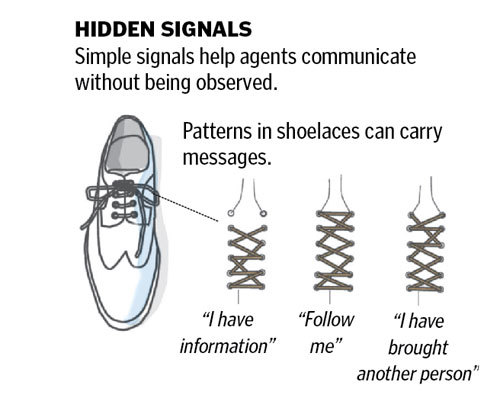
That’s not the best one.
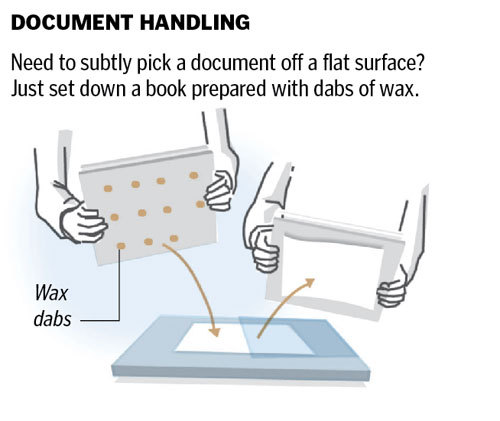

How to throw a paper plane
Paper planes are the stuff childhood dreams are made of. I’m almost certain every pilot flying commercially these days grew up experimenting with updraft, wingspan, and all manner of rudimentary rocket science using only a sheet of paper and the limits of the human imagination.
I remember printing out pages lined with Microsoft Publisher’s Paper Plane templates, and then experimenting further. On one occasion my sisters and I produced a garbage bag full of 100 paper planes. It was our airforce. I don’t think they made it much further than the bin.
This is a pretty long preamble to point out an awesome world record that just about anybody can break – provided you’ve got about 10,000 hours of spare time available to master the origamic art of Paper Plane Making.
Japan’s Takuo Toda is the current world record holder and, as such, the world’s premier paper plane pilot. He shares this tip in an article on a recent failed attempt to best his own record.
“In the world of competitive paper airplane throwing, a 20-second flight is exceptional, 25 or better is world class.”
Toda said that the secret to throwing a paper airplane is to aim upward — not straight — so that it has time to gain altitude and slowly circle back to the ground. Toda appeared to be on his way to a record Sunday, but his second and best throw was ruled a foul because it hit a passenger jetliner parked nearby.
“It’s really a sport,” he said. “The throwing technique is very delicate.”
Via Lee’s Lemon Harrangue Pie.
Here is the video of Toda’s world record flight.
Here’s a template from Wired for that plane.


